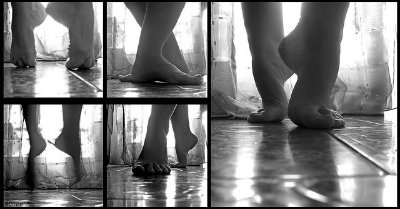From 4 years old right through college, my weeks were marked by a steady progression of dance classes. Ballet, tap, jazz – for a few years, baton twirling and competitions on the weekend.
I mark the years by the name of the teacher I was currently studying under. The Barbara years, the Jodi years, the Heather years.
During an adolescence marked by struggles with my weight and a steady onslaught of bullying and teasing, with all the self-loathing that combination always yields, my dance skills were a much-needed source of body pride for me.
I could do splits easily. Put my palms flat on the ground by my feet with straight legs. Pull my foot back up over my head and touch my nose with my toes.
And then chronic pain invaded the territory, planted flags, subdued the natives, and changed everything.
It didn’t really occur to me until a few years ago – over seven years into my new reality – that I’d lost something there.
I mean, sure, intellectually I grasped the concept that my days of pulling my foot over my head were probably over.
But the idea of having lost the body I used to have and enjoy eluded me. It just didn’t register, not until quite recently.
We all lost something when chronic pain became our new reality – something quite real: the body we used to know.
These new bodies we have aren’t at all similar. They refuse to cooperate. You want to go left, but the body has its own ideas. You want to get up and be active – it says “hell, no, this ass ain’t leaving the couch.” You want to stand straight and still at your best friend’s wedding – the body’s all “nah, I think I’m gonna feel dizzy now and lose my balance so you make a fool of yourself and upstage the bride.” You want to play ball with your kid – two pitches and the body goes “We’re done here.”
And then there’s the pain. Not just the pain you know – the all-too-familiar aches and cramps and buzzes and stabs. Also the new pains – the breakthrough pains, the unfamiliar sensations that happen suddenly after a movement you’ve done a million times before without a problem, the involuntary spasms in places that never felt pain before.
We’ve lost that body. And even though we can improve, get stronger, and even heal – we can’t get that body back. It’s gone – it’s forever been changed.
It’s a real loss, and it needs to be grieved.
When my mother died, I felt immediate grief. I did a lot of crying those first few days, and I felt the full force of the loss at her funeral.
But then a week or so later, something odd happened. It was like a switch got flipped. I felt nothing. Pure numbness, emotionally speaking.
Granted, I had a lot of shit going on about that same time.
Something about that whole series of events seemed to shut me down emotionally, and put a halt to the grieving process as matters of survival took precedence.
But a funny thing happened. After I went through that Category 5 shitstorm, and after I’d managed to get my feet back underneath myself, boom: the grief was right there again. Insistent. Pervasive. It even invaded my dreams. I’d dream about Mom all the time, and every single time, though the dreams themselves varied, there’d be a point in each where I’d remember that she had died. And then the next moment, which was even worse, I’d wonder, “Which was the dream? Her death or her being alive?”
My point – and I do have one – is that grief will not be denied. One way or another, we’re going through whichever of those five stages we need to hack our way through.
Once we get through those stages, we can finally be free of that baggage, at least, and get serious about rebuilding our lives, and taking care of the bodies we have now.
Photo Credit : Mena Rota via photopin cc
